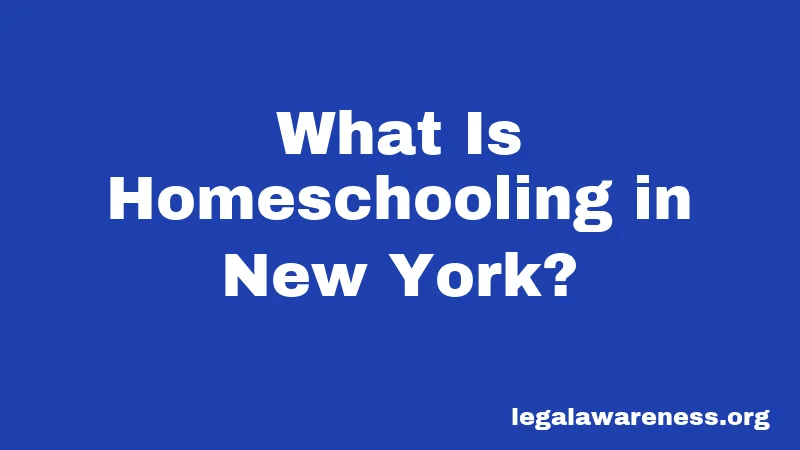New York Homeschool Laws (2026): Your Complete Roadmap
Most people have no idea how strict New York’s homeschool laws actually are. Seriously. But here’s the good news: once you understand the rules, they’re totally manageable. Let’s break down everything you need to know.
Homeschooling in New York is legal. You have the right to teach your kids at home instead of sending them to a public or private school. But—and this is important—New York requires you to follow specific rules. The state wants to make sure your children get a solid education. When you follow these rules, everyone wins.
What Is Homeschooling in New York?

Okay, so what exactly counts as homeschooling here? Homeschooling means you, the parent, teach your child at home. You choose the curriculum. You set the schedule. You’re responsible for everything. Pretty straightforward, right?
Here’s the key: New York State Education Department (NYSED) requires families to teach specific subjects and submit documentation every year. This isn’t optional. Think of it like this: the state is making sure your student gets a quality education that’s comparable to public school. That’s why the paperwork exists.
Your homeschooled kids won’t get access to free public school resources. No textbooks from the district. No computers provided by the school. No sports programs or club activities through the school system. That’s an important distinction. You’re handling all of that yourself.
Before You Start: Age Requirements and Deadlines
Hold on—this part is important. In New York, kids must attend school starting when they turn six. Well, technically, they have to start school by September of the calendar year when they turn six.
So if your child turns six on October 15th, you still need to notify the district by July 1st of that same year. Not March when they have their birthday. July 1st. Mark it on your calendar.
School attendance is required until age 16. Some school districts bump that up to age 17. Check with your district to be sure.
Step 1: Submit Your Letter of Intent

Let’s talk about the paperwork. First things first: you need to send a Letter of Intent to your school district’s superintendent.
When do you submit it? You have two options. Either submit it by July 1st before the school year starts, or submit it within 14 days of when you actually start homeschooling. If you’re mid-year homeschooling, those 14 days matter. Don’t miss that deadline.
What happens next? The school district must respond within 10 business days. They’ll send you a copy of the home instruction regulations and a blank Individualized Home Instruction Plan (IHIP) form. That IHIP form is your next step.
Not sure what to include in your Letter of Intent? It’s simpler than you think. Just tell the district you’re planning to homeschool your child and provide their name and age. The district handles the rest.
Step 2: Create Your Individualized Home Instruction Plan (IHIP)
This is where your actual teaching plan comes together.
Your IHIP needs to outline exactly what you’re going to teach and how. Include your child’s name, age, and grade level. List the curriculum materials you’ll use. Explain your teaching schedule. Name the person who will be doing the instruction (usually you, but not always).
When’s it due? Within 28 days of when you start homeschooling. But honestly? You can begin teaching before you submit it. The IHIP doesn’t hold you back from getting started. It’s just documentation of what you’re planning to do.
Pro tip: Many families use the template the district provides. That’s totally fine. But you can also create your own as long as it covers the required subjects and includes all the information NYSED wants.
What Subjects Must You Teach?

Wondering if this applies to your situation? The subject requirements depend on your child’s grade level. Let me break it down by age.
Grades 1-6: You must teach arithmetic, reading, spelling, writing, English language, geography, United States history, science, health education, music, visual arts, and physical education. If your child needs bilingual education or English as a second language, include that too.
Grades 7-8: English (that’s 2 units worth). History and geography (2 units). Science (2 units). Mathematics (2 units). Physical education regularly. Health education regularly. Art (half a unit). Music (half a unit). Practical arts regularly. Library skills regularly.
Grades 9-12: English (4 units). Social studies (4 units), including American history, participation in government, and economics. Mathematics (2 units). Science (2 units). Art and/or music (1 unit). Health education (half unit). Physical education (2 units). Plus three units of electives.
Sound complicated? Honestly, it’s not as rigid as it looks. You can cover these subjects in creative ways. Online classes count. Art lessons count. Work experience in practical arts counts. The district isn’t checking every single day. They’re checking that you’re covering the material.
Important note: At some point during grades 1-8, you must teach U.S. history, New York State history, and the U.S. and New York State Constitutions.
Instructional Hours: How Much Teaching Is Enough?
Here’s the question every parent asks: how many hours do I actually need to teach?
Grades 1-6: You need 900 hours of instruction per school year. The school year runs from July 1 through June 30 in New York. That sounds like a lot until you do the math. It’s roughly 4-5 hours a day, five days a week.
Grades 7-12: You need 990 hours per school year. Slightly more than elementary, but we’re still talking about 5-6 hours a day.
Here’s what makes this easier: instruction can happen any time of day, any day of the week. You’re not limited to traditional school hours. Summer learning counts. Saturday lessons count. Evening classes count. Online instruction counts. Field trips with an educational purpose count.
Homeschooling families get creative here. Music lessons, sports coaching, volunteer work, life skills—all of these can contribute to your instructional hours when they align with required subjects.
Quarterly Reports: Keeping the District Updated
Four times a year, you’re going to submit a Quarterly Report to your school district. These are required. They’re not optional.
What goes in a Quarterly Report? Include the number of instruction hours for that quarter. Describe what material you covered in each subject. Provide either a grade for your child in each subject OR a written evaluation of their progress. If you taught less than 80% of the planned material in any subject, explain why.
When do you submit them? You decide the dates in your IHIP. Once you choose those dates, stick to them. The district is counting on your consistency.
Sound overwhelming? Most parents find this pretty manageable once they get in a routine. You’re already tracking what your child is learning anyway. This is just putting it on paper.
Annual Assessment: Proving Your Child Is Learning
This is where the state makes sure your student isn’t falling behind. Every year, you need to complete an annual assessment. No opt-outs. No exceptions. It’s required.
What form can the assessment take? You get to choose. Option one: a commercially published, norm-referenced achievement test. Tests like the CAT, IOWA, and Stanford meet this requirement. Option two: a written narrative evaluation prepared by specific people.
For grades 1-3: You can use either a standardized test OR a narrative evaluation.
For grades 4-8: Standardized testing is required at least every other year. On the off years, you can use a written narrative instead. A certified teacher, peer review panel, or approved evaluator writes the narrative after interviewing your child and reviewing their work.
For grades 9-12: Standardized testing is required yearly. These grades are more rigorous.
What does “norm-referenced” mean? Basically, the test compares your child’s performance to students nationwide. You want your child scoring at or above the 33rd percentile. That means they’re at least meeting a basic standard.
Important: You submit your annual assessment with your fourth (final) quarterly report by June 30. Include it with your last quarterly report in one email.
Wait, This Is Getting Real: What If Your Child Struggles?
Not sure what counts as a violation? Let’s talk about what happens if there’s a problem.
If your child’s assessment scores fall below the 33rd percentile, the district will contact you. Same thing if your reports show your child isn’t making adequate progress. Don’t panic—this doesn’t mean you automatically stop homeschooling.
The district will ask questions. They want to understand what’s happening. If there’s a genuine problem, your homeschool program gets placed on probation. That means you’ll need to work with the district to improve things. You might need to adjust your approach or add resources.
Honestly? This rarely leads to forced enrollment in public school. It usually leads to better planning and support. The goal is helping your child succeed, not punishing you.
High School Matters: Diplomas and College
Here’s where it gets interesting. Are you planning for college?
New York homeschoolers don’t automatically get a New York State diploma. You can issue your own homeschool diploma when they complete the required coursework. But that diploma might not be accepted by colleges.
This is important for college-bound students. Most colleges want either a traditional diploma or specific documentation. You have options:
First, request a “Letter of Substantial Equivalency” from your school district. This letter states that your child completed a program substantially equivalent to public school graduation requirements. Colleges recognize this.
Second, your child can take the GED or High School Equivalency exam. Passing this shows colleges your child has met high school standards.
Third, your student can enroll in college-level courses before graduation. Early college credits look impressive on applications.
Create a transcript too. Include the courses your child took, credit hours, and grades. This matters a lot for college applications.
Special Education: If Your Child Needs Extra Support
Confused about the difference? Let me break it down.
If your child has an Individualized Education Program (IEP) from a previous public or private school enrollment, you still have rights. Homeschooled students with disabilities can access special education services. You’ll need to submit a Notice of Intent specifically requesting these services.
In New York City, that’s a different process with different deadlines. If you’re in the city, contact your local Committee on Special Education (CSE) early. They can explain what’s available in your district.
Outside the city, contact your district’s special education department. They’re required to work with you to make sure your homeschooled child gets appropriate services if they qualify.
New Law Alert: Participation in School Activities
Wait, it gets better. New York just passed legislation that might give you more options.
There’s a pending bill that would allow homeschooled students to participate in interscholastic athletics and driver’s education courses through their local school district. Currently, this isn’t allowed. But the legislature is working on changing that.
The law would let homeschooled kids try out for sports teams and take driver’s ed classes alongside public school students. If this passes, you’d pay any associated fees, but your child gets to participate.
Check your district’s website or call them to see if this is available yet or coming soon. It varies by location.
Tax Benefits Coming Your Way?
Here’s something new for 2026 that parents are excited about.
A bill in the New York legislature would create a tax credit for homeschooling parents. We’re talking up to $2,400 per year for learning materials—textbooks, workbooks, educational software, videos, supplemental reading materials. If this passes, families could get real money back.
The credit would apply to tax years starting January 1, 2026. Keep an eye on this. It’s not finalized yet, but it’s moving through the legislature.
Record Keeping: What You Need to Keep
Here’s what you’re not required to keep: receipts, worksheets, daily lesson plans, or test papers. Seriously. The state doesn’t demand all that paperwork.
Here’s what you ARE required to keep: attendance records and annual assessments. Your school district can ask to see these. Keep them organized and accessible. Attendance records should show the total number of instruction hours each quarter.
Some families keep portfolios of their child’s work anyway. It’s not required, but it helps you track progress and reassures you that learning is actually happening.
Getting Your Child to College
College applications from homeschoolers? Totally normal. Schools accept them every day.
Here’s what colleges want to see: your child’s transcript with coursework and grades. Standardized test scores if available. Letters of recommendation. A strong essay explaining your homeschool program.
Honestly, colleges actually respect homeschool applications sometimes. They see independent learners. They see families committed to education. They see responsible young people.
Build that transcript carefully. Document everything. If your child takes community college courses or online classes through accredited providers, include those. Use legitimate curriculum providers. It all adds up to a credible academic record.
The Resources You’ll Want
You’re going to need some help. Here’s where to find it.
NYC Families: If you’re in New York City, visit www.schools.nyc.gov/enrollment/enrollment-help/home-schooling. The city has specific requirements and deadlines. Their staff can answer questions.
Statewide: Check the New York State Education Department website at www.nysed.gov/nonpublic-schools/home-instruction. You’ll find the official regulations (Part 100.10), questions and answers, and contact information.
Homeschool Groups: Connect with local homeschooling organizations. They know your district’s specific requirements. They’ve done this before. They’ll help you navigate the process.
Your School District: Seriously, call them. The superintendent’s office has staff dedicated to homeschooling questions. They’re required to respond within 10 business days of your Letter of Intent. Use them as a resource.
Frequently Asked Questions
Do I need a teaching certificate to homeschool in New York?
Nope. New York doesn’t require parents to have any specific qualification to homeschool. You don’t need a teaching degree. You don’t need a certification. Just follow the regulations.
Can my homeschooled child take classes at the local public school?
It depends on the district. Some allow it. Some don’t. The law doesn’t guarantee access to individual classes, though it’s changing for driver’s ed and sports. Ask your superintendent what’s available in your district.
What if I want to stop homeschooling and re-enroll in public school?
Just notify the district. Your child can re-enroll in public school at any time. The transition is usually smooth, though the school might want to assess where your child is academically.
Can I use an online school instead of doing it myself?
Yes, technically. But here’s the catch: New York State doesn’t recognize diplomas from online-only schools. Your child won’t get a state diploma from an online program, even if that program claims to be “accredited” or “certified.” Online school can be part of your homeschool plan, but it can’t be your whole plan for high school graduation.
What if my child fails the annual assessment?
That doesn’t automatically mean you stop homeschooling. The district will work with you. You might adjust your curriculum. You might add support services. You might get an evaluation from a certified teacher. The goal is improvement, not punishment.
Do I pay school taxes if I homeschool?
Yes. You still pay property taxes that fund schools even if your child is homeschooled. There’s currently no state tax reduction for homeschooling families, though that might change with new legislation.
Final Thoughts
New York’s homeschool laws are detailed, but they’re not impossible. Thousands of families do this successfully every year. The requirements exist to make sure your child gets a real education. Once you understand the rules, you’ve got this.
Here’s the bottom line: Submit your Letter of Intent on time. Create a thoughtful IHIP that covers all required subjects. Send in quarterly reports consistently. Complete annual assessments. Keep simple records.
Now you know the basics. Stay informed, stay organized, and when in doubt, reach out to your school district. They actually want to help you succeed.
References
New York State Education Department – Home Instruction
New York Codes, Rules and Regulations – Part 100.10 Home Instruction
NYC Public Schools – Home Schooling
